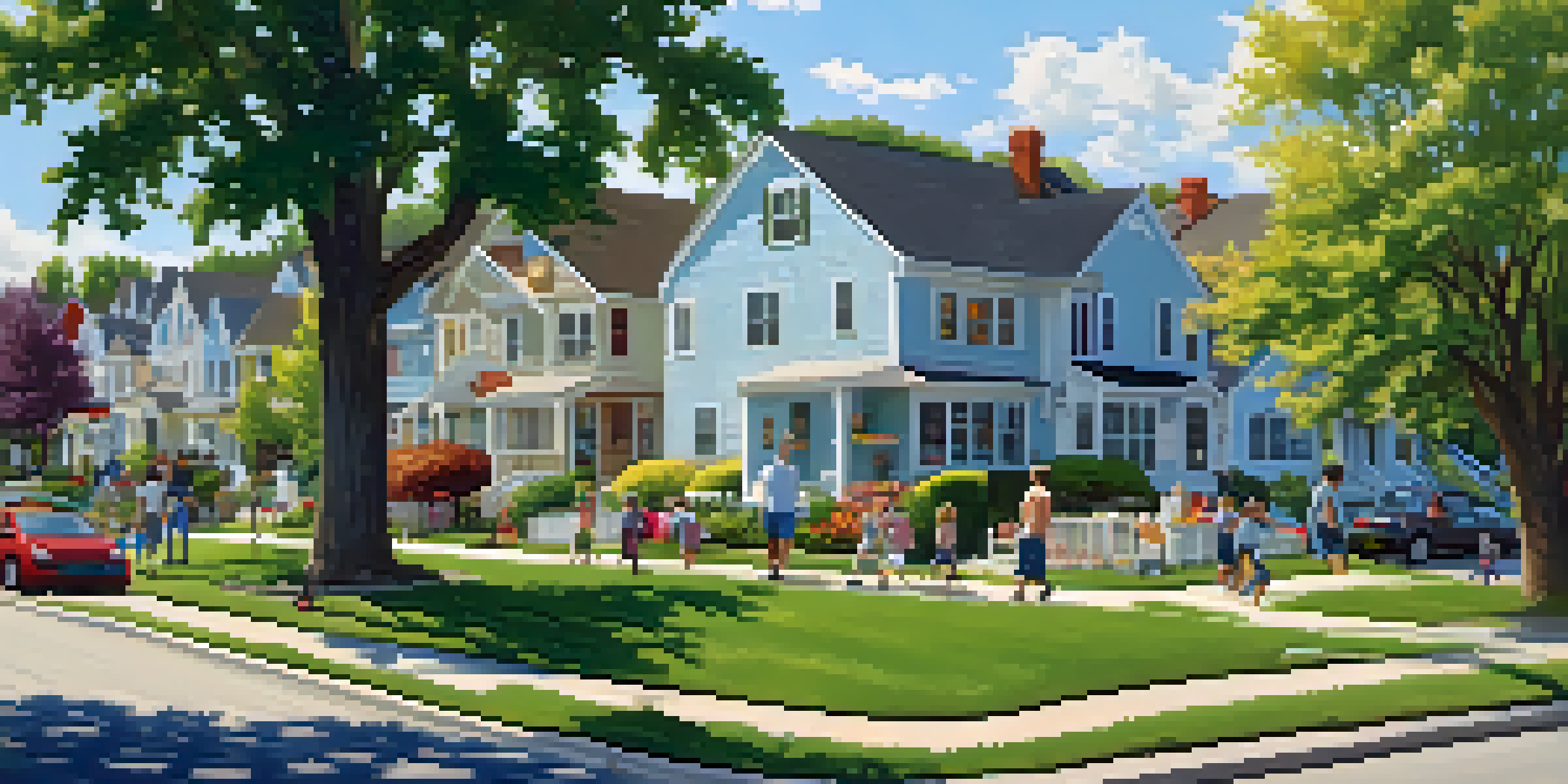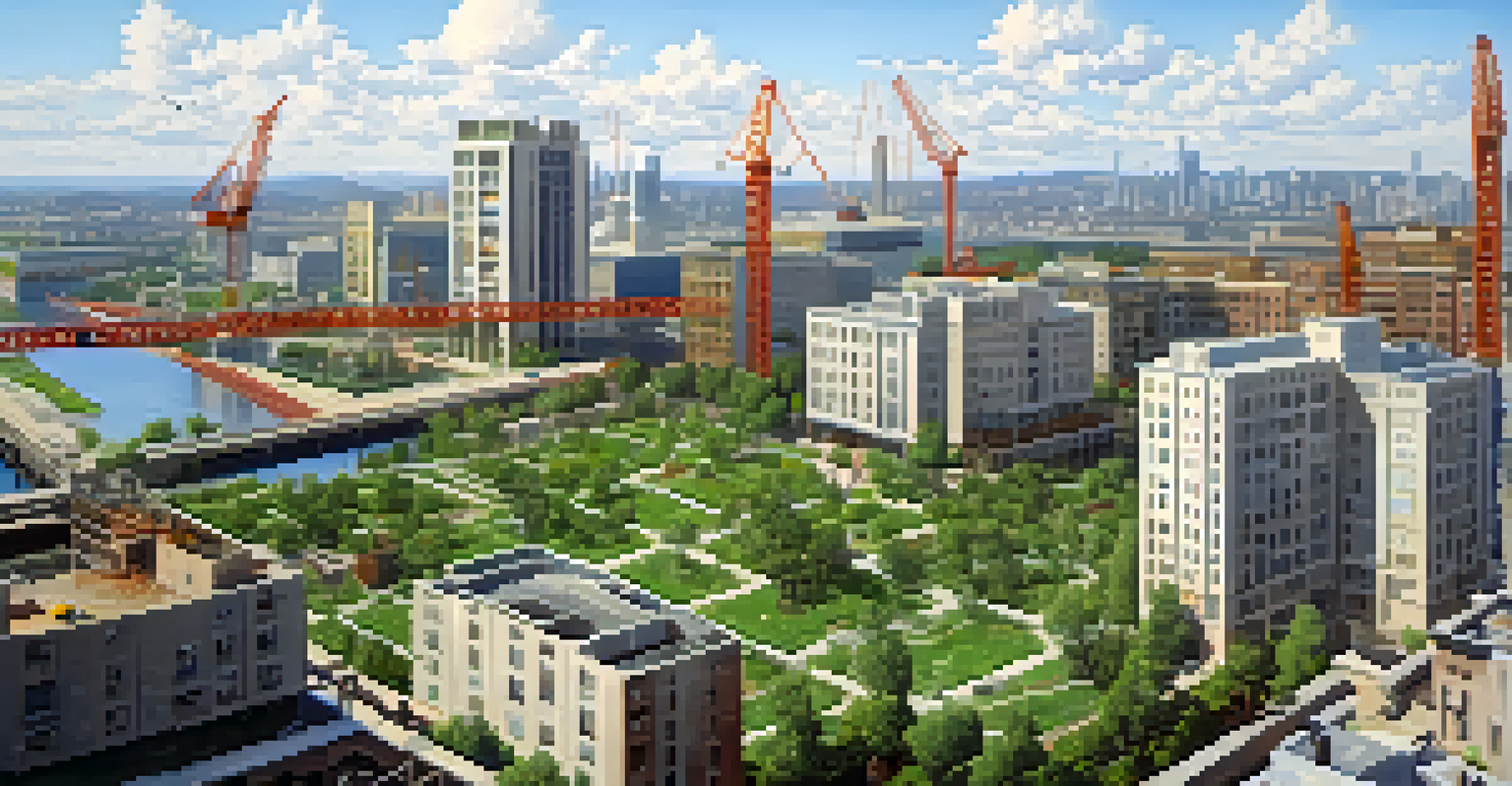The Relationship Between Zoning and Property Taxes

What is Zoning and Why Does It Matter?
Zoning refers to the laws that dictate how land can be used in specific areas. These regulations can designate areas for residential, commercial, or industrial use, influencing the overall character of neighborhoods. For example, a residential zone may feature single-family homes, while a commercial zone might house shops and offices. Understanding zoning is essential for property buyers as it directly affects property values and potential uses.
Zoning is not just about land use; it's about the future of our communities and the quality of life for our residents.
The impact of zoning extends beyond land use; it also affects the amenities available in a neighborhood. For instance, a well-zoned area may have parks, schools, and public transport, making it attractive to families. This desirability can increase property values and, subsequently, property taxes. Therefore, zoning plays a crucial role in shaping community dynamics and economic growth.
Moreover, zoning laws can evolve over time in response to community needs or growth. Changes in zoning can lead to increased development, which may attract more residents and businesses to an area. As these changes occur, property values can rise, leading to higher property taxes for homeowners. Navigating zoning regulations is key for anyone involved in real estate.
How Property Taxes Are Calculated
Property taxes are typically based on the assessed value of a property, which is determined by local tax assessors. These assessors evaluate various factors, including the property's location, size, and condition, as well as recent sales of similar properties in the area. This process can be influenced by zoning, as properties in desirable zones often fetch higher prices, resulting in increased assessed values.

Once the assessed value is determined, the local government applies a tax rate to calculate the property tax owed. This rate can vary significantly based on the municipality and is influenced by budgetary needs for public services, such as schools, infrastructure, and safety. Therefore, areas with higher property values—often due to favorable zoning—may experience higher tax rates to fund these services.
Zoning Affects Property Values
Zoning regulations significantly influence property values, with desirable zones typically leading to higher demand and taxes.
Homeowners should be aware that changes in zoning can lead to fluctuations in property taxes. For example, if an area is rezoned for commercial development, the increase in economic activity can drive up property values and, consequently, taxes. Understanding how these factors interconnect can help homeowners better prepare for changes in their tax bills.
The Impact of Zoning on Property Values
Zoning regulations can significantly influence property values in various ways. For instance, areas designated for single-family homes often see stable demand, whereas mixed-use zones may attract higher interest due to diverse business opportunities. This demand can push property values up, leading to higher property taxes for owners. Therefore, there’s a clear relationship between zoning designations and how much a property is worth.
Property taxes are the price we pay for civilization, and they are deeply intertwined with how we choose to use our land.
Additionally, properties located in well-planned zones with amenities like parks and schools typically appreciate more than those in less desirable zoning areas. Buyers often look for neighborhoods that offer a good balance of residential and commercial options, leading to increased demand. Consequently, as demand rises, so do property values and the associated taxes.
It's also important to note that negative changes in zoning can decrease property values. For example, if a residential area is rezoned for industrial use, homeowners may see their property values drop due to noise and pollution concerns. This scenario illustrates the delicate balance zoning plays in real estate and its financial implications for homeowners.
Zoning Changes and Their Tax Implications
When zoning changes occur, the implications for property taxes can be profound. For example, if a residential area is rezoned for higher-density housing, property values may rise as developers seek to take advantage of the new regulations. This increase in property values can lead to higher tax assessments, impacting homeowners and potential buyers alike.
On the other hand, if zoning changes lead to a decrease in desirability—such as allowing heavy industry in a residential area—property values may decline. This reduction could result in lower property taxes for homeowners, which might provide some relief but also reflect a decline in the neighborhood's overall appeal. Thus, the effects of zoning changes on property taxes can be a double-edged sword.
Tax Implications of Zoning Changes
Changes in zoning can have profound effects on property taxes, either increasing them with rising property values or decreasing them if desirability declines.
Homeowners should stay informed about potential zoning changes in their areas, as these decisions can impact their financial future. Participating in local zoning meetings or following community boards can provide insights into upcoming regulations and their possible effects on property taxes.
Case Studies: Zoning and Property Taxes in Action
Examining real-world examples can illuminate the relationship between zoning and property taxes. In a city where zoning was relaxed to allow mixed-use developments, property values surged as restaurants and shops opened alongside residential units. This surge brought higher property taxes, but many homeowners welcomed the improved amenities and increased community vibrancy.
Conversely, consider a neighborhood that was historically residential but was rezoned for commercial use. Property values initially increased due to new business opportunities, but as noise and traffic concerns grew, some homeowners found their quality of life diminished. This shift resulted in a mixed impact on property values and taxes, highlighting the complexities of zoning decisions.
These case studies illustrate how the relationship between zoning and property taxes is not one-size-fits-all. Each community's unique characteristics and needs can lead to different outcomes, emphasizing the necessity for homeowners to remain engaged with local zoning regulations.
The Role of Local Government in Zoning and Taxation
Local governments play a pivotal role in determining zoning laws and property tax rates. City planners and elected officials assess community needs and develop zoning regulations that aim to balance growth, economic development, and residents' quality of life. Their decisions can have lasting effects on property values and taxes, making their role crucial in shaping community landscapes.
In addition to establishing zoning laws, local governments often set property tax rates based on budgetary requirements. As communities grow and change, these rates may adjust to ensure adequate funding for public services like schools and infrastructure. This interplay between zoning and taxation means that local government actions can directly impact homeowners' financial responsibilities.
Local Government's Key Role
Local governments shape zoning laws and tax rates, impacting community development and homeowners' financial responsibilities.
Homeowners should actively participate in local governance, attending meetings and voicing their opinions on zoning proposals. Engaging with local officials can help residents stay informed about potential changes that could affect their property values and taxes.
Future Trends in Zoning and Property Taxes
As urban areas continue to evolve, zoning and property taxes will also adapt to meet changing demands. Trends such as increased remote work may shift the focus from urban to suburban areas, influencing zoning regulations to accommodate more residential developments. This shift could lead to changes in property values and tax assessments as demand fluctuates in different regions.
Sustainability is another emerging trend impacting zoning laws. Many municipalities are beginning to prioritize environmentally friendly developments, which can lead to new zoning regulations. These changes might enhance property values in eco-conscious areas, potentially resulting in higher property taxes as communities strive to attract green businesses and residents.

Looking ahead, technology may also play a role in zoning and property taxation. Digital platforms could streamline the zoning application process and provide more transparent information about property assessments. By staying informed on these trends, homeowners can better prepare for the evolving landscape of zoning and property taxes.